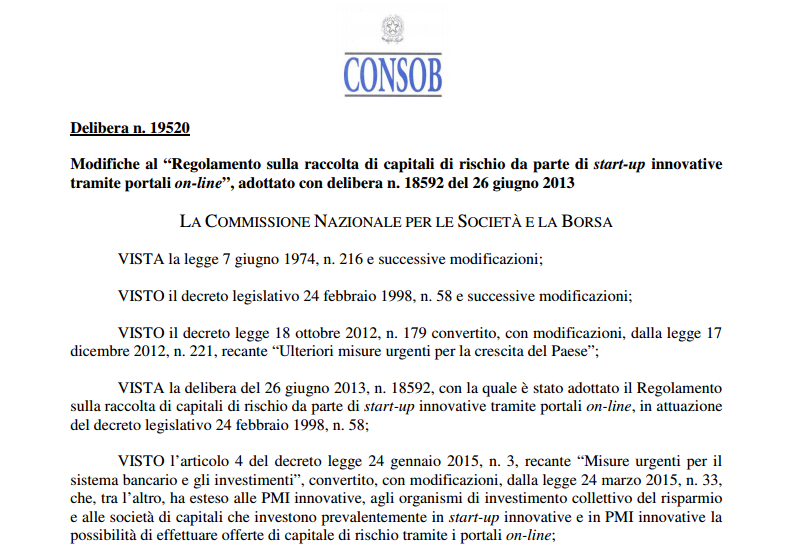 Italy’s financial markets supervision Authority, Consob, published a revision of its Equity Crowdfunding Regulation last February 25th which has been long awaited by Italian operators (see here the delibera n. 19520 del 24 febbraio 2016 and the Illustrative report, Italian version only, and see here new provisions of collection of capital for innovative startups and innovative SME’s introduced in the Consolidated Law of Finance).
Italy’s financial markets supervision Authority, Consob, published a revision of its Equity Crowdfunding Regulation last February 25th which has been long awaited by Italian operators (see here the delibera n. 19520 del 24 febbraio 2016 and the Illustrative report, Italian version only, and see here new provisions of collection of capital for innovative startups and innovative SME’s introduced in the Consolidated Law of Finance).
New provisions have been introduced by Consob after two different phases of public conusltations with market operators in order to simplify procedures, reduce operative costs and enlarge the number of subjects enabled to finance innovative business projects.
More in detail the proposed amendments that the Commission submitted to examination by the market had derived from innovations introduced last year by Parliament in the primary legislation and from the indications received in the last few months through a preliminary consultation with operators from which the need emerged to correct and reduce certain obligations provided for in the regulation of 2013.
On 24 March 2015, the Italian Parliament passed Decree No. 3 (the so-called Investment Compact issued by Italy’s Government last January, see here a previous post by BeBeez). The law introduces some impacting measures facilitating investments in Italy’s small and medium enterprises (SMEs). One of these is the creation of the category “innovative SMEs”, that would benefit of certain simplifications and fiscal incentives as innovative startups already do (see here a previous post by BeBeez).
A consequence of that provision was that Italy’s equity crowdfunding platforms would be intitled to publish offerings from innovative SMEs too, while venture capital firms will be allowed in turn to raise capital through equity crowdfunding platforms.
Moreover, taking into account the market’s requests, Consob extended the notion of “professional investors”, obliged to subscribe a portion of the offer. It was extended from the previousdefinition, which included mainly institutional investors, to a wider group. On the basis of the proposal this definition now includes anyone who fulfils the requirements set by the MiFID (the European directive on the provision of financial services) for the classification of “professional investors on request”, identified according to criteria of knowledge and experience in investment activities.
Consob also simplified the order execution procedure, reducing transaction costs. The objective is to make possible conclusion of transactions completely online, on condition that the operators have carried out the necessary checks.
In brief, rules have been amended on order execution so that operators will be able (opting-in) to check the appropriateness obtaining the requisites necessary for this purpose extending the protections to all transactions carried out according to the proportionate system (to the type of service performed) which will enable investors to conduct the transaction and conclude it completely on-line.
If the operators do not intend to carry out this check (default procedure), the MiFID rules will continue to be applied by banks and investment firms that receive orders no longer in addition to but instead of the “questionnaire” to be filled in on the website. The operator’s choice to carry out the check on its own or through the bank or investment firm to which the order is transferred – which can be done on the occasion of the application for authorisation or subsequently – must be applied generally with reference to all the offers published on the portal.


